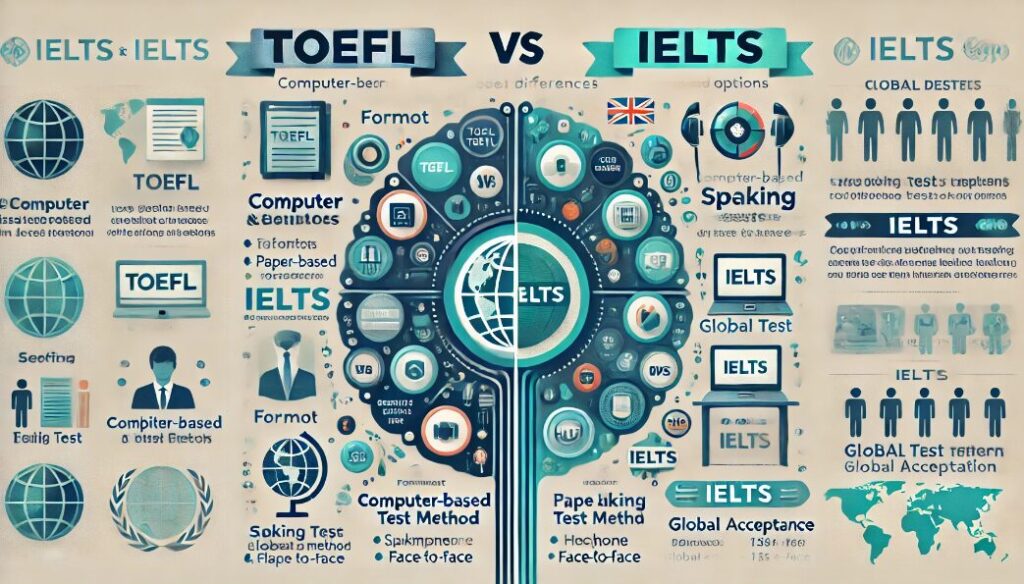Choosing between TOEFL (Test of English as a Foreign Language) and IELTS (International English Language Testing System) is a critical decision for non-native English speakers planning to study, work, or immigrate abroad. Both tests assess your English proficiency, but they differ significantly in format, cost, acceptance, and more. Here’s a comprehensive comparison to help you decide.

1. Global Recognition and Acceptance
- TOEFL: Widely accepted by universities in the United States and Canada. Many institutions in Europe, Asia, and Australia also recognize TOEFL scores.
- IELTS: Accepted worldwide by universities, employers, and immigration authorities. It is particularly preferred in the UK, Australia, and New Zealand.
Verdict: Choose TOEFL for US-focused academic goals and IELTS for broader geographical options.
2. Test Format
- TOEFL: Internet-based (TOEFL iBT) and consists of Reading, Listening, Speaking, and Writing sections. The Speaking section requires you to respond to prompts through a microphone, which is then evaluated later.
- IELTS: Available in two formats: Academic and General Training. The test includes Reading, Listening, Writing, and Speaking sections. The Speaking test is conducted as a face-to-face interview with an examiner.
Verdict: TOEFL is better for tech-savvy test-takers, while IELTS suits those who prefer human interaction in the Speaking test.
3. Difficulty Level
- TOEFL: Questions are often more academic, with complex vocabulary and integrated tasks. Ideal for those with strong academic English skills.
- IELTS: Considered slightly easier due to its more straightforward language and practical tasks. However, the Speaking interview may be nerve-wracking for some.
Verdict: IELTS is generally perceived as more accessible, but TOEFL can be advantageous if you excel in academic English.
4. Test Duration
- TOEFL: Approximately 3 hours.
- IELTS: 2 hours and 45 minutes.
Verdict: IELTS is shorter and may be less exhausting.
5. Scoring System
- TOEFL: Scores range from 0 to 120, with each section worth 30 points.
- IELTS: Scores range from 0 to 9 bands, with half-band increments.
Verdict: TOEFL’s numeric scale may feel more precise, while IELTS’s band system offers a broader assessment.
What’s your English level?
Discover your level now: A1/A2/B1/B2/C1/C2 and GET your certificate!
6. Cost
- TOEFL: Costs vary by country, typically ranging from $190 to $250.
- IELTS: Generally priced between $215 and $250.
Verdict: Both are similarly priced; check the specific fees in your region.
7. Test Locations and Availability
- TOEFL: Available in over 150 countries with numerous test dates.
- IELTS: Equally accessible worldwide, with both paper-based and computer-based options.
Verdict: Both offer extensive global availability, but IELTS provides flexibility with test formats.
8. Validity Period
- TOEFL: Scores are valid for 2 years.
- IELTS: Also valid for 2 years.
Verdict: No difference here.
9. Preparation Resources
- TOEFL: ETS offers official practice tests, free resources, and apps.
- IELTS: British Council, IDP, and Cambridge provide official preparation materials and mock tests.
Verdict: Ample preparation resources are available for both, but choose based on the test you’re more comfortable with.
10. Immigration Requirements
- TOEFL: Not as commonly used for immigration purposes.
- IELTS: Preferred by immigration authorities in countries like Canada, Australia, and the UK.
Verdict: Opt for IELTS if your goal includes immigration.
Both TOEFL and IELTS are excellent tests to demonstrate your English proficiency. Your choice should depend on your specific goals, the test’s acceptance in your target country or institution, and your personal preferences regarding test format and difficulty. Take time to evaluate which aligns better with your strengths and aspirations.
Good luck with your English proficiency journey!




